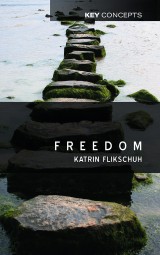Details

Freedom
Contemporary Liberal PerspectivesKey Concepts 1. Aufl.
|
17,99 € |
|
| Verlag: | Wiley |
| Format: | EPUB |
| Veröffentl.: | 23.04.2013 |
| ISBN/EAN: | 9780745654744 |
| Sprache: | englisch |
| Anzahl Seiten: | 208 |
DRM-geschütztes eBook, Sie benötigen z.B. Adobe Digital Editions und eine Adobe ID zum Lesen.
Beschreibungen
In this engaging new book, Katrin Flikschuh offers an accessible introduction to divergent conceptions of freedom in contemporary liberal political philosophy. Beginning with a discussion of Isaiah Berlin's seminal distinction between negative and positive liberty, the book goes on to consider Gerald MacCallums alternative proposal of freedom as a triadic concept. The abiding influence of Berlin's argument on the writings of contemporary liberal philosophers such as Robert Nozick, Hillel Steiner, Ronald Dworkin and Joseph Raz, is fully explored in subsequent chapters. <p>Flikschuh shows that, instead of just one negative and one positive freedom tradition, contemporary liberal thinkers articulate the meaning and significance of liberal freedom in many different and often conflicting ways. What should we make of such diversity and disagreement? Should it undermine our confidence in the coherence of liberal freedom? Should we strive towards greater conceptual and normative unity?<br /> </p> <p>Flikschuh argues that moral and political disagreement about freedom can often be traced back to differences in underlying metaphysical presuppositions and commitments. Yet these differences do not show liberal freedom debates to be confused or incoherent. On the contrary, they demonstrate the centrality of this philosophically elusive idea to the continued vitality of liberal political thinking.</p>
Introduction:. <p>Approaching Liberal Freedom.</p> <p>Chapter 1:.</p> <p>Isaiah Berlin: Two Concepts of Liberty?.</p> <p>Chapter 2:.</p> <p>Gerald MacCallum: Freedom as a Triadic Concept.</p> <p>Chapter 3:.</p> <p>Robert Nozick: Negative Freedom and Property Rights.</p> <p>Chapter 4:.</p> <p>Hillel Steiner: The Natural Right to Pure Negative Liberty.</p> <p>Chapter 5:.</p> <p>Ronald Dworkin: Freedom as an Aspect of Equality.</p> <p>Chapter 6:.</p> <p>Joseph Raz: The Social Value of Personal Autonomy.</p> <p>Conclusion:.</p> <p>Liberal Freedom – Positive, Negative, Either or Neither?.</p> <p>Bibliography</p>
‘A refreshing and illuminating critical introduction to the real diversity of liberal thought about freedom beyond the Rawlsian paradigm, and a striking demonstration of the ways in which political theorists inevitably find themselves engaging in metaphysical reflection.’<br /> <p><b>Stephen Mulhall, <i>New College, Oxford</i></b><br /> </p> <p><br /> </p> <p>‘This book gives an excellent and very welcome survey of recent debates about freedom in the liberal tradition. It combines a lucid, judicious and even-handed presentation of the ideas of key thinkers with a series of critical insights of its own. It will be of interest and value to students across the full range of subject areas – in political, ethical, legal and social theory – where freedom is a matter of core concern. Readers will discover that approaching the topic of freedom, even within liberal political philosophy, points them in the direction of a rich, diverse and fine-grained heritage of conceptual debates – to which Flikschuh’s book provides an exemplary guide.’<br /> </p> <p><b>Gideon Calder, <i>University of Wales, Newport</i></b></p>
<b>Katrin Flikschuh</b> is Lecturer in Political Theory at the London School of Economics and Political Science.
In this engaging new book, Katrin Flikschuh offers an accessible introduction to divergent conceptions of freedom in contemporary liberal political philosophy. Beginning with a discussion of Isaiah Berlins seminal distinction between negative and positive liberty, the book goes on to consider Gerald MacCallums alternative proposal of freedom as a triadic concept. The abiding influence of Berlins argument on the writings of contemporary liberal philosophers such as Robert Nozick, Hillel Steiner, Ronald Dworkin and Joseph Raz, is fully explored in subsequent chapters. <p>Flikschuh shows that, instead of just one negative and one positive freedom tradition, contemporary liberal thinkers articulate the meaning and significance of liberal freedom in many different and often conflicting ways. What should we make of such diversity and disagreement? Should it undermine our confidence in the coherence of liberal freedom? Should we strive towards greater conceptual and normative unity? Flikschuh argues that moral and political disagreement about freedom can often be traced back to differences in underlying metaphysical presuppositions and commitments. Yet these differences do not show liberal freedom debates to be confused or incoherent. On the contrary, they demonstrate the centrality of this philosophically elusive idea to the continued vitality of liberal political thinking.</p>


















